Monday 8 December 1941
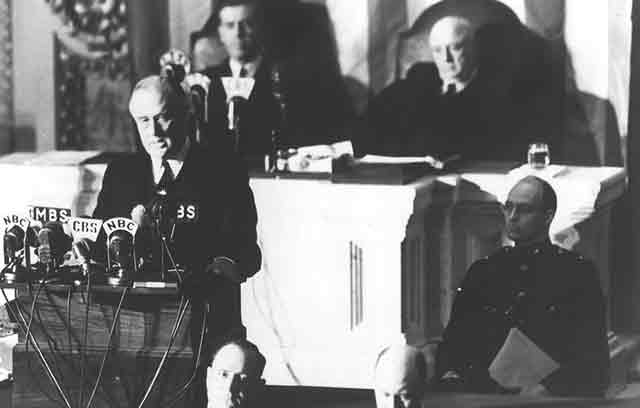 |
| President Roosevelt as he delivers his "Day of Infamy" speech, 8 December 1941. |
 |
| President Roosevelt delivers his "Day of Infamy" speech, 8 December 1941. |
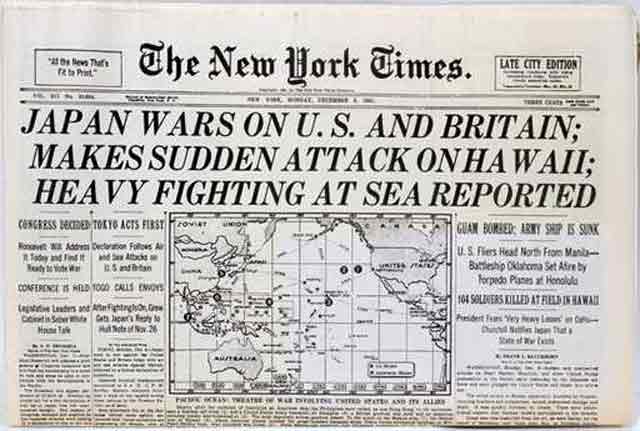 |
| The NY Times on 8 December 1941 highlights "heavy fighting at sea" that is non-existent. In fact, there is virtually no fighting at sea anywhere in the Pacific. |
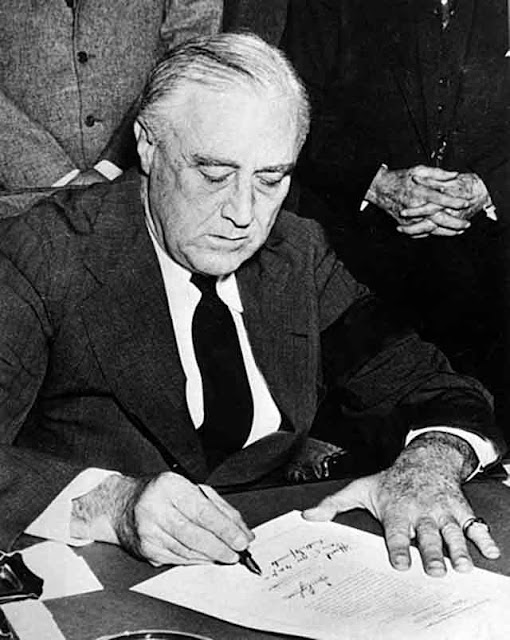 |
| President Roosevelt signs the declaration of war on the Empire of Japan, 8 December 1941. |
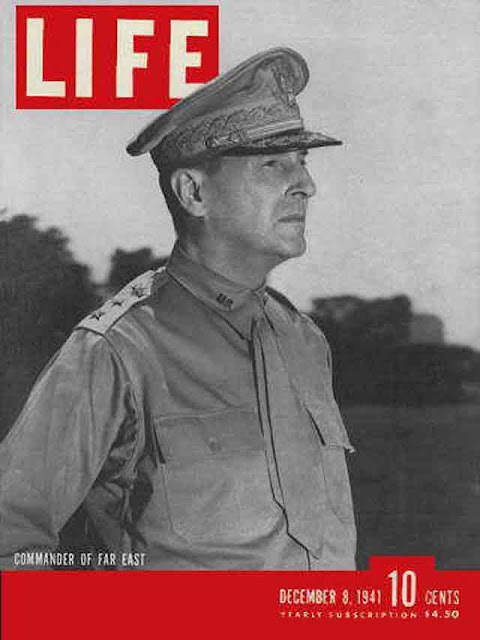 |
| Life magazine has the extraordinary good fortune of having planned to feature Douglas MacArthur on the cover of its 8 December 1941 edition. |
- The 14th Army of the IJA lands at tiny Batan Island off of Luzon.
- Japanese aircraft based on Saipan bomb the United States base on Guam.
- 36 Japanese Mitsubishi G3M3 medium bombers flown from bases on the Marshall Islands attacked Wake Island, destroying 8 of 16 F4F-3 Wildcats that had just arrived at the island.
- The Japanese 21st, 23rd and the 38th Regiments under the command of Lieutenant General Takashi Sakai attack British, Canadian, Indian, as well as the local Hong Kong Chinese Regiment, and the Hong Kong Volunteer Defence Corps in Hong Kong.
- Two Japanese destroyers shell Midway Island.
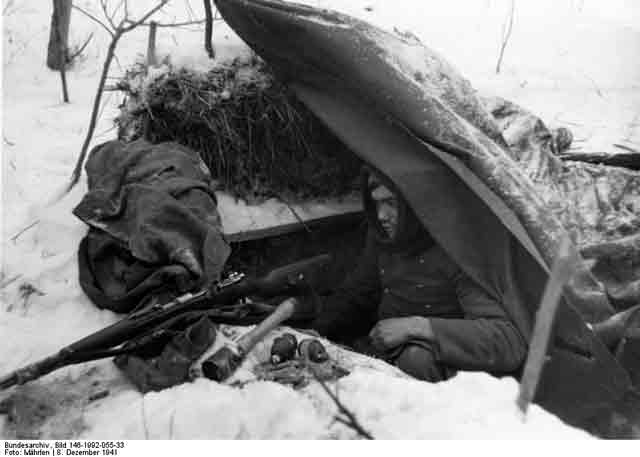 |
| German soldiers at Korjakowa, about 66 km southeast of Moscow, huddle against the chill, 8 December 1941 (Mährlen, Federal Archive Picture 146-1992-055-33). |
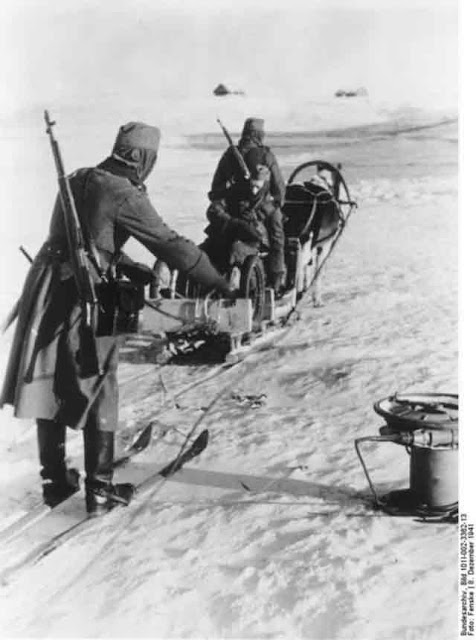 |
| Some German soldiers on the Eastern Front near Molwoitzi lay a field radio cable using a Panji sled, 8 December 1941 (Fenske, Federal Archive Picture 101I-002-3362-13). |
We have been stepping closer to war for many months. Now it has come and we must meet it as united Americans regardless of our attitude toward the policy our government has followed. Whether or not that policy has been wise, our country has been attacked by force of arms and we must retaliate.There are long lines at U.S. military recruitment centers across the country. Lindbergh himself will seek to be recommissioned in the USAAF. However, the Secretary of War, Henry L. Stimson, will decline the request on instructions from the White House. Lindbergh instead will work as a consultant to military equipment manufacturers and see unofficial action in the Pacific.
Glenn Miller and his Orchestra return to work as usual on Monday morning despite the war news. They record "Moonlight Cocktail" with vocals by Ray Eberle and The Modernaires, "Moonlight Cocktail" goes on to hit No. 1 on February 28, 1942, and stays there for ten weeks - longer than any other Glenn Miller single. The song had been around since 1912 when Charles Luckeyeth Roberts composed it. James Kimball "Kim" Gannon added the lyrics.
 |
| A United States Marine Corps recruiting station on 8 December 1941. |
DAY OF INFAMY SPEECH
Yesterday, December 7, 1941 — a date which will live in infamy — the United States of America was suddenly and deliberately attacked by naval and air forces of the Empire of Japan.The United States was at peace with that nation, and, at the solicitation of Japan, was still in conversation with its government and its Emperor looking toward the maintenance of peace in the Pacific.
Indeed, one hour after Japanese air squadrons had commenced bombing in the American island of Oahu, the Japanese Ambassador to the United States and his colleague delivered to our Secretary of State a formal reply to a recent American message. And, while this reply stated that it seemed useless to continue the existing diplomatic negotiations, it contained no threat or hint of war or of armed attack.
It will be recorded that the distance of Hawaii from Japan makes it obvious that the attack was deliberately planned many days or even weeks ago. During the intervening time the Japanese Government has deliberately sought to deceive the United States by false statements and expressions of hope for continued peace.
The attack yesterday on the Hawaiian Islands has caused severe damage to American naval and military forces. I regret to tell you that very many American lives have been lost. In addition, American ships have been reported torpedoed on the high seas between San Francisco and Honolulu.
Yesterday the Japanese Government also launched an attack against Malaya.
- Last night Japanese forces attacked Hong Kong.
- Last night Japanese forces attacked Guam.
- Last night Japanese forces attacked the Philippine Islands.
- Last night the Japanese attacked Wake Island.
Japan has therefore undertaken a surprise offensive extending throughout the Pacific area. The facts of yesterday and today speak for themselves. The people of the United States have already formed their opinions and well understand the implications to the very life and safety of our nation.
As Commander-in-Chief of the Army and Navy, I have directed that all measures be taken for our defense, that always will our whole nation remember the character of the onslaught against us.
No matter how long it may take us to overcome this premeditated invasion, the American people, in their righteous might, will win through to absolute victory.
I believe that I interpret the will of the Congress and of the people when I assert that we will not only defend ourselves to the uttermost but will make it very certain that this form of treachery shall never again endanger us.
Hostilities exist. There is no blinking at the fact that our people, our territory and our interests are in grave danger.
With confidence in our armed forces, with the unbounding determination of our people, we will gain the inevitable triumph, so help us God.
I ask that the Congress declare that since the unprovoked and dastardly attack by Japan on Sunday, December 7, 1941, a state of war has existed between the United States and the Japanese Empire.
 |
| Fire engine ladders are used to create a "V for Victory" symbol in front of the United States Capitol building, 8 December 1941. |
December 1941
December 1, 1941: Hitler Fires von Rundstedt
December 2, 1941: Climb Mount Niitaka
December 3, 1941: Hints of Trouble in the Pacific
December 4, 1941: Soviets Plan Counteroffensive
December 5, 1941: Soviets Counterattack at Kalinin
December 6, 1941: Soviet Counterattack at Moscow Broadens
December 7, 1941: Japan Attacks Pearl Harbor
December 8, 1941: US Enters World War II
December 9, 1941: German Retreat At Moscow
December 10, 1941: HMS Prince of Wales and Repulse Sunk
December 11, 1941: Hitler Declares War on US
December 12, 1941: Japanese in Burma
December 13, 1941: Battle of Cape Bon
December 14, 1941: Hitler Forbids Withdrawals
December 15, 1941: The Liepaja Massacre
December 16, 1941: Japan Invades Borneo
December 17, 1941: US Military Shakeup
December 18, 1941: Hitler Lays Down the Law
December 19, 1941: Brauchitsch Goes Home
December 20, 1941: Flying Tigers in Action
December 21, 1941: The Bogdanovka Massacre
December 22, 1941: Major Japanese Landings North of Manila
December 23, 1941: Wake Island Falls to Japan
December 24, 1941: Atrocities in Hong Kong
December 25, 1941: Japan Takes Hong Kong
December 26, 1941: Soviets Land in the Crimea
December 27, 1941: Commandos Raid Norway
December 28, 1941: Operation Anthropoid Begins
December 29, 1941: Soviet Landings at Feodosia
December 30, 1941: Race for Bataan
December 31, 1941: Nimitz in Charge
2020
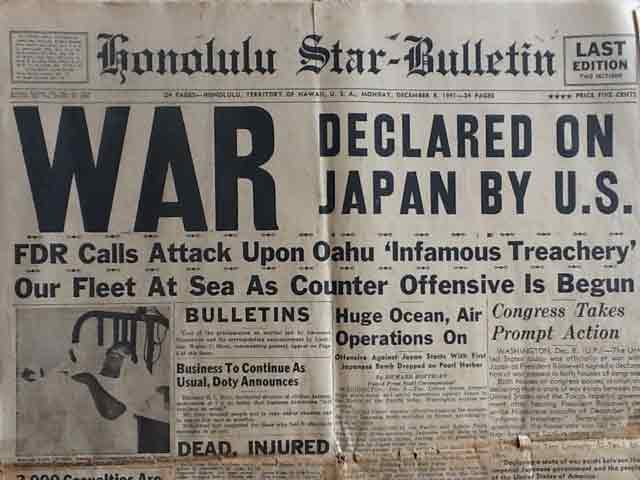
No comments:
Post a Comment